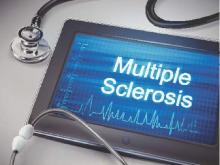The burden of psychiatric comorbidity is greater in patients with multiple sclerosis (MS), compared with the general population, reported Dr. Ruth Ann Marrie and coauthors from the departments of psychiatry and medicine at the University of Manitoba, Winnipeg.
A study of 44,452 MS patients and 220,849 controls in four Canadian provinces from 1995 to 2005 found that the incidence of depression in the MS group was 0.98% (95% CI; 0.81%-1.15%), compared with 0.72% (95% CI; 0.67%-0.76%) in the control group. The prevalence of depression was 20.1% in MS patients (19.5%-20.6%), compared with 11.9% (11.8%-12.1%) in the matched population, the authors noted.
Also, the incidence and prevalence of anxiety disorder in the MS population was 0.64% (0.54%-0.73%) and 8.7% (8.4%-9.1%), respectively, compared with 0.42% (0.39%-0.45%) and 5.1% (4.9%-5.2%) in controls .
For bipolar disorder, the MS group had an incidence of 0.33% (0.26%-0.39%), compared with 0.16% (0.14%-0.18%) in controls. Prevalence was 4.7% (4.4%-4.9%) in the MS group and 2.3% (2.2%-2.3%) in controls .
Lastly, in schizophrenia, MS patients had an incidence of 0.060% (0.031%-0.080%), compared with 0.018% (0.011%-0.024%) in controls. Prevalence was 1.28% (1.15%-1.41%), in the MS group and 1.03% (0.99%-1.08%) in controls, the investigators said.
The findings suggest a “nonspecific effect of MS on psychiatric comorbidity,” Dr. Marrie and colleagues said in the report.
“From a policy perspective, this implies the need for general psychiatric support rather than illness-specific strategies,” they concluded.
Read the study in Neurology.


